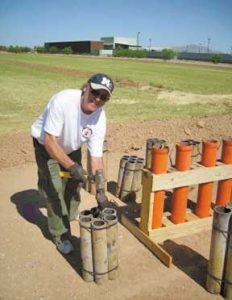
On Dec. 1, Chandler and Tempe residents may begin to see an influx of firework retail stores, as Arizona’s law allowing “consumer fireworks” goes into effect.
Terry Borgendale, co-owner of Winco Fireworks, said he is prepared to open eight to 12 firework stands by the end of next month, as well as a permanent year-round store in the future.
To his dismay, however, Borgendale said there seems to be a significant amount of opposition to consumer fireworks across Arizona from city officials who believe them to be dangerous.
“In reality, none of these novelty fireworks that will be sold will have any capability of blowing off a finger, or anything close to that,” he said.
“Today’s firecrackers contain a mere 50 milligrams of flash powder and have been that way since 1976. There is no way this amount of explosive will blow anyone’s finger or arm off.”
Borgendale said the fireworks that will be legal to sell will include only small-scale, fuse-lit sparklers, smoke canisters and spinning wheels, none of which are capable of lifting off the ground more than five feet.
“None go up into the air or explode,” he said. “We are not allowed to sell roman candles, bottle-rockets or anything of this sort that have the capability of exploding.”
Although some city officials have continued to criticize the new law, other states are much more relaxed on the topic, Borgendale said.
“Obviously, Arizona is a dry state, and that’s part of the concern,” he said. “The local fire departments are against fireworks, but in other states it can be the fire department that actually sells them.”
In Arkansas, the state police sell fireworks as part of a fundraiser, Borgendale said, and firemen in Oklahoma sell them there.
“Fireworks can be very safe,” Borgendale said. “You can just as easily start a fire with a cigarette; it’s just common sense.”
Hosing down your driveway, front lawn and areas where you will be using fireworks is always a good precautionary measure to take, he said.
“Just read the label and follow the instructions and you can be safe,” Borgendale said. “With children involved, there always should be parent supervision.”
The abuse of fireworks is often the result of people who have been drinking alcohol and who don’t take the time to read the label, or giving them to kids and not watching them closely to help ensure safety, Borgendale said.
“These fireworks only ignite for about 30 seconds to a couple minutes,” he said. “I can hurt myself just as easily with a lawn mower.”
Current city ordinances, however, are prohibiting any use of consumer fireworks and adding more provisions to where fireworks can be sold.
For many vendors, this is bad news that contradicts Gov. Jan Brewer’s move to allow the sale of ground fireworks to residents ages 16 and up.
On Oct. 21, the city of Tempe passed an ordinance prohibiting the “use, discharge or ignition of fireworks within the city.”
Chandler, under a 2006 measure, already prohibits the use of consumer fireworks, Marc Walker, assistant chief of the Chandler Fire Department, said.
Cities, however, do have the option of delegating the use of fireworks to certain days of the year, for example New Year’s Eve and July 4. However, Mike Reichling, public information officer for the Tempe Fire Department, said Tempe will not allow the use of consumer fireworks at any time during the year.
“The Fire Marshal Association tested the consumer fireworks, and found them to be too dangerous,” he said. “It would be counter-productive to our efforts.”
Reichling said public information officers from local cities met last week to discuss strategies for education the public on what cities will allow the use of fireworks.
“This can be extremely confusing to residents, because some cities will allow the use of fireworks during certain times of the year, while others won’t,” he said.

